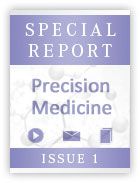Scoring System May Help Guide Therapy in Triple-Negative Breast Cancer
Homologous repair deficiency or a high HRD score identified triple-negative breast cancers that had an increased likelihood of pathologic complete response to chemotherapy, according to a study reported at the 2015 ASCO Annual Meeting.
Gunter von Minckwitz, MD

Gunter von Minckwitz, MD
Homologous recombination deficiency (HRD) or a high HRD score identified triple-negative breast cancers (TNBCs) that had an increased likelihood of pathologic complete response (pCR) to chemotherapy, according to a study reported at the 2015 ASCO Annual Meeting.
In the TNBC analysis, the pCR rate increased from 45.2% to 64.9%, respectively, in HR-deficient tumors treated with the carboplatin combination compared with those who received the chemotherapy doublet.BRCA-negative primary tumors that had high HRD scores had a significantly higher pCR rate with the carboplatin regimen than didBRCA-negative tumors treated with the doublet.
However, primary tumors containing mutantBRCAdid not derive significant benefit from carboplatin by the primary definition of pCR used in the study but ironically did benefit significantly when a more stringent definition of pCR was applied.
“HR deficiency in TNBC is an independent predictor of high pCR rates to neoadjuvant chemotherapy with paclitaxel and liposomal doxorubicin with or without carboplatin,” said Gunter von Minckwitz, MD, managing director of the German Breast Group Research Institute. “However, results using pCR [as defined in this study] as an endpoint are inconsistent, and a formal interaction between HR deficiency and carboplatin could not be shown.
“Results have to be confirmed by other studies and set into context with survival data,” he said.
Tumors with reduced DNA repair capacity would be expected to exhibit high sensitivity to DNA-damaging therapy. DNA repair capacity can be assessed by means of an HRD assay. Using tissue specimens obtained from a completed randomized clinical trial, investigators sought to determine whether the HRD assay can predict sensitivity to chemotherapy with or without carboplatin.
The GeparSixto trial involved patients with HER2-positive or TNBC, randomized to paclitaxel and liposomal doxorubicin with or without chemotherapy. The primary analysis showed a higher pCR rate among patients treated with carboplatin, but the greater activity came at a price of increased toxicity.
The ability to predict responsiveness to carboplatin prior to treatment would spare patients unlikely to achieve pCR the toxicity of the third drug.
The study of HRD focused on 315 patients from GeparSixto with TNBC. Investigators determined the HRD score on the basis of the cumulative total of loss-of-heterozygosity score, telomeric allelic imbalance score, and large-scale state transitions score.
The HRD score has a range of 0 to 100, and von Minckwitz et al defined a high HRD score as 42 or greater. The investigators defined HR deficiency as a high HRD score or the presence of aBRCAmutation in the primary tumor.
The study’s primary endpoint was pCR, defined as ypT0/is ypN0 (residual in situ disease). The secondary endpoint was pCR more stringently defined as ypT0 ypN0 (no residual invasive or in situ disease).
HR deficiency could be adequately assessed in 193 of the 315 triple-negative tumors. Of those, 136 proved to be HR deficient, 81 of which had high HRD scores despite the absence of mutantBRCAin the primary tumor.
Using the primary endpoint definition of pCR, von Minckwitz et al found a pCR rate of 29.8% in the 57 HR nondeficient tumors and 55.9% in the 136 HR-deficient tumors (OR, 2.98;P<.001). Use of the more stringent definition of pCR resulted in response rates of 24.6% and 50.0% in HR nondeficient and deficient tumors, respectively.
The data showed that 30 HR-nondeficient and 62 HR-deficient tumors were assigned to doublet therapy, which resulted in pCR rates of 20.0% and 45.2%, respectively (OR, 3.29:P= .016). In the carboplatin arm, the pCR rate was 40.7% in 27 HR-nondeficient tumors and 64.9% in 74 HR-deficient tumors (OR, 2.68;P= .03).
For the secondary endpoint, pCR rates were 20.0% and 33.9% in the HR-nondeficient and deficient tumors assigned to doublet therapy (P= .162), increasing to 29.6% and 63.5% in the carboplatin arm (OR, 4.13;P= .002).
Investigators analyzed pCR rates by treatment and according to different definitions of HR deficiency. Tumors that were HR deficient by HRD score had pCR rates of 36.6% with the chemotherapy doublet and 63.2% with carboplatin (OR, 2.97;P= .018). A smaller, nonsignificant difference emerged from analysis of tumors containing mutantBRCA(61.9% vs 72.7%,P= .406).
Use of the more stringent pCR criteria resulted in pCR rates of 31.7% and 63.2% for the doublet and carboplatin arms in tumors with high HRD scores (OR, 3.67; P =0.005). Tumors containing mutantBRCAalso had significantly higher pCR rates with carboplatin (69.7% vs 38.1%, OR, 3.74; P = .022).
von Minckwitz G, Timms K, l Untch M, et al. Prediction of pathological complete response (pCR) by Homologous Recombination Deficiency (HRD) after carboplatin-containing neoadjuvant chemotherapy in patients with TNBC - Results from GeparSixto.J Clin Oncol33, 2015 (suppl; abstr 1004).
<<<

Advances in Subsequent Therapies Shake Up Sequencing of ccRCC Treatment
April 25th 2024With the approval of belzutifan and other newer data for treating patients with recurrent renal cell carcinoma, the state of subsequent therapies is advancing beyond the reuse of frontline options with impacts on duration of response and quality of life.
Read More
Breast Cancer Leans into the Decade of Antibody-Drug Conjugates, Experts Discuss
September 25th 2020In season 1, episode 3 of Targeted Talks, the importance of precision medicine in breast cancer, and how that vitally differs in community oncology compared with academic settings, is the topic of discussion.
Listen
Novel Approaches Focus on Limiting Toxicity in Older Patients With ALL
April 22nd 2024The major challenges for clinicians treating older patients with acute lymphoblastic leukemia surround the emergence of resistance to existing therapies and the toxicities associated with current chemotherapies.
Read More